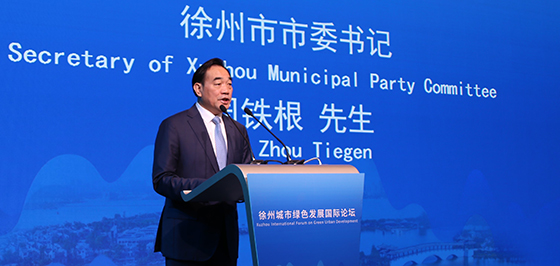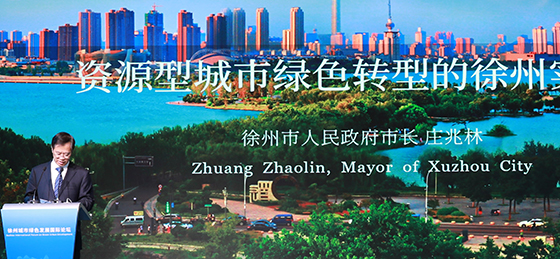12 June 2019, Xuzhou (Jiangsu Province, China) - The Xuzhou Municipality and UN-Habitat hosted prominent experts in urban planning and environmental management for a 3-day international gathering on green urban development and eco-restoration.
Xuzhou, with an urban population of more than 4 million people, closed about 300 open-pit and underground coal mining locations in the past 15 years as well as 47 cement factories, 15 steel factories and 8 coking installations. It also took 52,000 heavily polluting vehicles off the road.
Xuzhou then set off a citywide greening programme, decontaminating waters and soils, turning quarry and subsidence areas into parks and wetlands and reforesting idle lands and hills. Investment, especially in high-tech companies, expanded 18-fold in the past decade and a million jobs were created.

Xuzhou’s Quarry-Pit Park. A stone quarry was closed and environmentally re-landscaped starting 2009. It is now a popular city park.
Xuzhou received the UN-Habitat Scroll of Honour in October 2018 and the Executive Director of UN-Habitat Mrs. Maimunah Mohd Sharif visited the city recently. In a video message on the opening of the International Forum on Green Urban Development Ms. Sharif said that the city understood the challenges but also the potentials of transformation,.
In his opening speech, the Secretary of Xuzhou, Mr. Zhou Tiegen, called green development a key principle for the acceleration of investment. Xuzhou seeks excellence in environmental management and urban planning, as core capacities in support of urban resilience and as enablers for sustained economic innovation.

Secretary Zhou Tiegen opening the conference on 11 June.
Maximizing sustainable urban development was also the message of Mr. Wu Hongbo, former Under-Secretary General of UN-DESA. Both Mr. Wu Hongbo and Mr. Bruno Dercon, of UN-Habitat’s Regional Office for Asia and the Pacific, highlighted that the Asia-Pacific region will not reach many of the SDG targets by 2030, without accelerating the implementation of many of the environmental goals, in relation to air pollution, circularity, resilience and biodiversity; and much of the battle will be in cities.
In that context, the subsequent daylong discussions highlighted the great potentials, and challenges, of forceful transformation in areas and cities where mines close, as showcased in experiences in China, Korea, Germany, Poland and the Czech Republic. More insights were offered by speakers from the Slovak Republic, Spain, Italy, the UK, US and Hong Kong.
The Forum was supported by three academic institutions in Xuzhou, including the China University of Mining and Technology, the Xuzhou University of Technology and Jiangsu Normal University. The leading German institution in eco-restoration, the Leibniz Institute of Ecological Urban and Regional Development provided international support.
Prof. Dr. Bernhard Mueller, the director of the Leibniz Institute, summarized why eco-restoration practices after the closures of mines are so instructive: success requires leadership and vision, inclusive approaches, institutional collaboration, committed governance frameworks and integrated, comprehensive planning. More succinctly, success requires both landscape changes and social changes, always focusing on the potentials rather than the challenges. These issues were explored in discussions on urban planning and environmental rehabilitation, where also many prominent Chinese academicians and speakers shared rich experience.
At the occasion of the Forum, the Xuzhou Government launched two technical standards, developed in collaboration with the China Society for Landscape Architecture, on the ecological restoration of coal mining subsidence areas and of quarry-pits. Experts in the Forum welcomed the standards, citing that they contain tremendous experience, detailed guidance but also important principles, such as protecting the native original vegetation.
The City also released an urban planning guideline, developed in collaboration with UN-Habitat. The Guideline for Eco-restoration and Innovation was developed to support the detailed planning in and around subsidence areas in north Xuzhou and introduced strong planning principles in the context of peri-urban regeneration. The guideline provides a framework for compact, well-connected and walkable urban neighbourhoods mixed with enterprise zones, making use of renewable and water features intelligently and integrating heritage into public space.

Mayor Zhuang Zhaolin setting out the citywide strategy on eco-restoration at the Forum on 11 June.
In his keynote speech, Mayor Zhuang Zhaolin of Xuzhou had already made the case for successful urban renewal. Green urban development has been the business card of Xuzhou. The city’s commercial areas and hospitals appeal now to visitors well beyond the municipality itself, he said. Building on the eco-restoration achievements of the last decade, Xuzhou now aspires sustainability, resilience and a strong social and cultural vision.
The next generation of Xuzhou’s programmes will focus not on expansion but regeneration. All experts agreed that the city has developed the capacity, through eco-restoration after the mines closed, to continue taking on change and innovation.
Environmental Rehabilitation
- ・Dr. Ana Mendes, Invited professor at the University of Evora, Portugal (PPTX 45.1MB)
- ・Dr. Ralf-Uwe Syrbe, Research Associate of Leibniz Institute of Ecological Urban and Regional Development (PDF 10MB)
- ・Mr. Jörg Schlenstedt, Senior Expert of Lusatian and Central German Mining Management Company (LMBV), Germany (PDF 11.7MB)
Urban Planning and Land Use
- ・ Dr. Ali Cheshmehzangi, Head of Department of Architecture and Built Environment, University of Nottingham Ningbo (PDF 2.7MB)
- ・Mr. Gianluca Ghiara, Key Expert of the European Program EC-Link (Europe China Eco Cities Link), Advisor for Deutsche Gesellschaft für Internationale Zusammenarbei (PDF 1.3MB)







